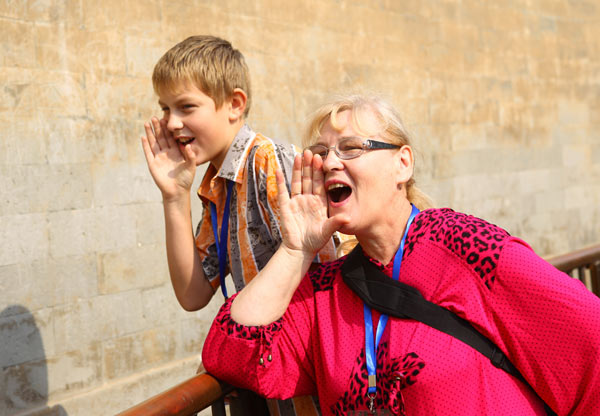Russian families embrace Chinese culture
Updated: 2012-10-05 01:00
By Zheng Jinran (China Daily)
|
||||||||
 |
|
Russian visitors Bobrova Lubov and her son Dedlovski Muchail Victoloviq test the Echo Wall at the Temple of Heaven in Beijing on Tuesday. Zou Hong / China Daily |
The National Day holiday saw about 50 Russian families travel to Beijing, many on their first visit to China.
The visitors were billeted with Chinese host families who shared Chinese culture and daily life with them, and enjoyed trips to the Great Wall and other major sights.
The families were the guests of the Beijing Municipal Commission of Tourism Development, and were invited to the capital as part of a push by Beijing authorities to promote China as a tourist destination in Russia.
Vladimir Tolstoy, the great-great grandson of the famous Russian author Leo Tolstoy, who penned War and Peace and Anna Karenina, was part of the group.
"We all loved this trip very much, especially my children who are visiting China for the first time," the adviser to the Russian president said.
He said Russia and China share a similar culture centered around the family.
"We have no difficulties in understanding the culture, and many of my friends love Chinese history," he said.
Vladimir Tolstoy’s family manages the former home of his famous great-great grandfather. Called Yasnaya Polyana, the old house is located just outside of Tula, Russia, and boasts a large museum dedicated to the famous author. It attracts thousands of tourists every year.
Vladimir Tolstoy said a highlight of his trip was a visit to the National Museum of China, where the bronzeware, some of which is 4,000 years old, left a deep impression on him. He said he hopes to learn more about running a museum from his Chinese counterparts.
"We can hold exhibitions in Moscow and Beijing, showing people the splendid culture. It will be a good way to work toward better communication," he said.
Wang Jiliang, 68, a radio engineer from Beijing, hosted a Russian family.
"It is my way to repay the support my Russian friends gave me for the past 40 years," he said.
Wang learnt Russian when he was a student in the 1950s. He improved his language skills by exchanging letters with a Russian girl, whose address was listed in a Russian radio magazine.
"I could not afford a radio back then, so I wrote her a letter asking for help," he said. "She replied and sent me the parts to help me assemble a radio by myself."
Wang’s homemade radio won a prize in Beijing in the 1950s and gave him the opportunity to work for the Chinese Academy of Sciences. "I went to Russia to find her, but she had died," he said. "So I want to take this chance to show my appreciation to other Russian people."
The guests had such an impact on Wang’s family that when they left his 92-year-old mother cried.
"It’s hard to part with friends," Wang explained. "As long as we can take care of ourselves, we will host more Russian families in the future."
Another host, Qiu Mingzhu, said her son benefited from the exchange.
"My son became more considerate when playing with the Russian boy, explaining new things in English or just body language," she said.
Contact the writer at zhengjinran@chinadaily.com.cn

 Relief reaches isolated village
Relief reaches isolated village
 Rainfall poses new threats to quake-hit region
Rainfall poses new threats to quake-hit region
 Funerals begin for Boston bombing victims
Funerals begin for Boston bombing victims
 Quake takeaway from China's Air Force
Quake takeaway from China's Air Force
 Obama celebrates young inventors at science fair
Obama celebrates young inventors at science fair
 Earth Day marked around the world
Earth Day marked around the world
 Volunteer team helping students find sense of normalcy
Volunteer team helping students find sense of normalcy
 Ethnic groups quick to join rescue efforts
Ethnic groups quick to join rescue efforts
Most Viewed
Editor's Picks

|

|

|

|

|

|
Today's Top News
Health new priority for quake zone
Xi meets US top military officer
Japan's boats driven out of Diaoyu
China mulls online shopping legislation
Bird flu death toll rises to 22
Putin appoints new ambassador to China
Japanese ships blocked from Diaoyu Islands
Inspired by Guan, more Chinese pick up golf
US Weekly

|

|






